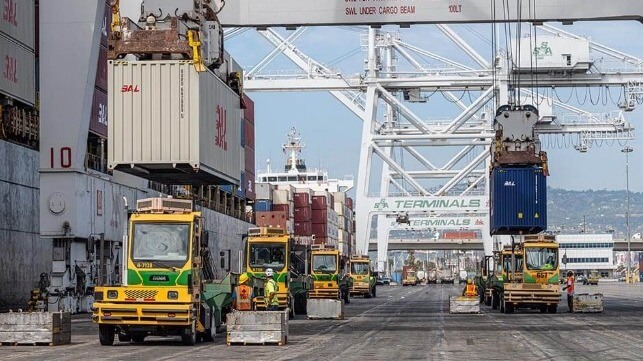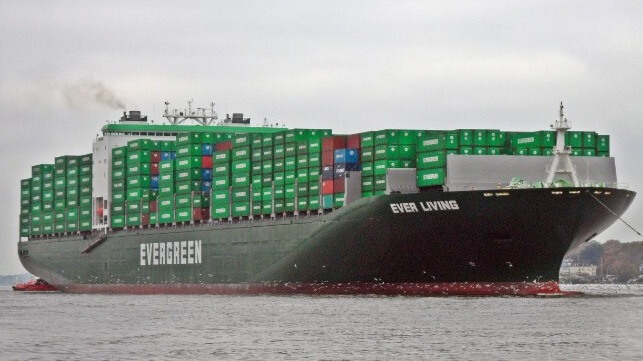FMC Publishes New Rules on Detention and Demurrage Charges

The Federal Maritime Commission on Friday released its highly anticipated update and clarification on the rules for detention and demurrage (D&D) charges. These fees became one of the most hotly contested elements of the industry contribution to the passage of the U.S.’s Ocean Shipping Reform Act of 2022 and hundreds of complaints ranging from hundreds to millions of dollars filed with the FMC.
“The new rule will advance the Commission’s goal of promoting supply chain fluidity by ensuring a clear connection between the failure to pick up cargo or return equipment in a timely manner and the appropriate fee. The rule ensures that billed parties understand the demurrage or detention invoices they receive by requiring certain identifiable information be included by the billing party on the invoice,” the FMC writes in announcing the publication of its 115-page Demurrage and Detention Billing Requirements.
The review and revision of the rules was required by the Reform Act and is the result of an extensive process. The FMC has been dealing with hundreds of individual complaints that range from unreasonable behavior to issues such as can the fees include days when the facilities are unavailable, who can be billed, the process for informing and billing, and the process for billing and appealing.
The final rule issued today establishes new requirements for how common carriers and marine terminal operators must bill for demurrage and detention charges, providing clarity on who can be billed, within what timeframe, and the process for disputing bills.
A key provision of the rule determines that demurrage or detention invoices can only be issued to either the entity that contracted with the billing party for the ocean transportation or storage of cargo, removing truckers who complained they were also being billed by the terminals and carriers. The rule however does permit the “consignee,” defined as “the ultimate recipient of the cargo or the person to whom final delivery of the cargo is to be made,” to also be billed. As such it fails to address the complaints of receivers who argued they never contracted the shipment but were still being billed D&D fees.
In addition to defining who can be billed the final rule defines steps in the process. Vessel operators and terminals now have 30 calendar days from when the last charge was incurred to send a bill. Also, it eliminates issuing bills to multiple parties simultaneously.
An appeal process is defined giving 30 calendar days to make fee mitigation, refund, or waiver requests. The billing party must attempt to resolve the matter within 30 calendar days, unless both parties agree to a longer timeframe while failing to supply required (and defined) information eliminates any obligation of the billed party to pay the applicable charge.
Most of the rule takes effect on May 26, 2024, although the portion covering “Contents of Invoice” also requires approval by the Office of Management and Budget.
The goal was to provide better order and processes to the D&D fees. The Reform Act also provided new obligations for the carrier on how it operates. It remains to be seen if this will satisfy the complaints expressed by many of the leading trade organizations about the unjustified fees and shippers who complained of the excess fees with little response from carriers or terminal operators.
From Beyond, Bed Bath Files $4M Complaint Against Evergreen with FMC

The bankruptcy estate for former home goods retailer Bed Bath & Beyond continues to pursue its grievances against the shipping industry for its role in the demise of the chain. In its latest move, Bed Bath & Beyond (today known as DK-Butterfly) filed a $4.3 million complaint with the Federal Maritime Commission against Evergreen citing “a practice of systematically failing to meet its service commitments.”
Once a popular retailer at the beginning of 2020, the company was operating nearly 1,000 Bed Bath & Beyond stores and a total of 1,500 retail stores in addition to its robust online business. Issues that had been building for years in its business were compounded by the pandemic. In 2018-2019, the company slipped into the red reporting losses that continued to mount until April 23, 2023, when it filed for liquidation under U.S. bankruptcy laws. The trade name was later sold and continues to be operated by an unrelated online retailer.
As Bed Bath & Beyond was moving into liquidation it unleashed its assault on the shipping industry which former management blames for the downfall of the company. First, they filed a complaint against Orient Overseas Container Line citing $25 million in excess costs due to the carrier’s failure to meet contracted shipping levels as well as more than $6 million in what the retailer termed excessive detention and demurrage expenses. In a similar action, the bankruptcy estate is seeking reparations totaling more than $15 million from Yang Ming.
They followed their initial complaints with a filing against MSC Mediterranean Shipping. In that case, it is seeking a whopping $315 million for increased shipping costs and detention and demurrage charges the company incurred in 2020 and 2021 as well as for lost profits.
In a filing served February 21, DK-Butterfly is now adding similar complaints for Evergreen which they say systematically failed to meet two service contracts. As with the other carriers, they allege Evergreen “allocated the complainant’s bargained for space to higher-priced cargo from other shippers to maximize Evergreen’s own profits.” They state that the company’s 2020-2021 contract provided for the transportation of 1,250 FEU, but Evergreen carried only 20 percent of the commitment or a total of just over 256 FEUs. They admit the situation improved in 2021-2022 when they contracted for 750 FEUs and Evergreen transported 60 percent or nearly 456 FEUs.
Furthermore, they allege a “practice of coercing” to get the shipper to pay extracontractual prices and surcharges. Further content that a substantial majority of the detention and demurrage charges were for periods when conditions outside the company’s control prevented them from moving boxes.
Detailing the costs, the complaint says Bed Bath & Beyond incurred a total of nearly $4.3 in costs, including nearly $4 million in excess ocean freight fees as the retailer had to enter the spot market to ship its containers. They contend they also paid Evergreen more than $317,000 in extracontractual surcharges as well as more than $1.26 million in improper demurrage and detention charges.
As with the other complaints, the bankruptcy estate is asking the FMC at trial to calculate other injuries suffered by the retailer.
Each of the complaints stands independently and begins a process of discovery and responses. OOCL, for example, responded to the complaint in May 2023 writing that it believed the bankruptcy estate had started an “unfortunate campaign to distort and obfuscate the relevant facts, contracts, and law, in order to secure an unwarranted return.”
While the issues raised in the Bed Bath & Beyond complaints mirror those of other shippers, these by far are the largest dollar amount complaints filed with the FMC. It opens broader issues for the FMC and reflects the elements that drove the reforms to the Ocean Shipping Act as shippers broadly allege the carriers took advantage of the situation during the pandemic for their profits at the expense of their customers.
No comments:
Post a Comment